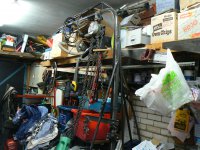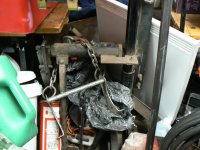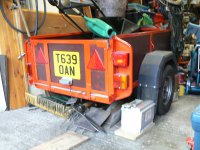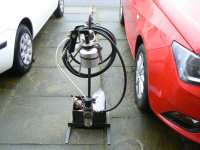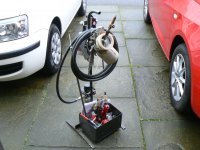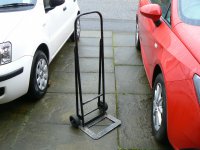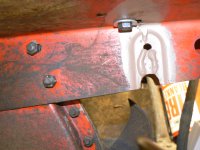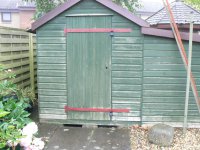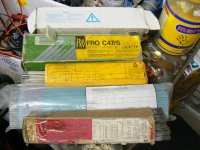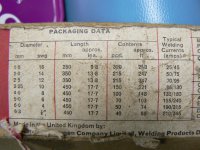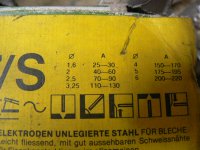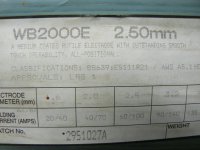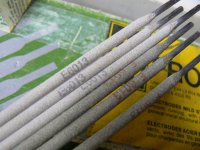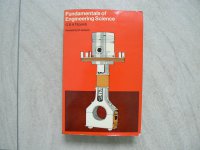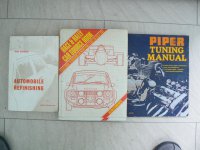You'll all be relieved to know I'm actually going to talk about gas supplies now!
As the weather was so lousy I spent some of the afternoon ringing round the three suppliers of "rent free" cylinders I've found near me for prices and conditions.
Their conditions of supply seem similar in most respects. To get myself set up I have to pay a deposit on the bottle. This is quite hefty but refundable in full (keep your receipt - no refund without paperwork!) if you decide to hand it back. So a nice wee bonus for Mrs J if I unexpectedly pop my cloggs. All she's got to do is hand the cylinder back and she's got money for drinks at the wake! Then you pay for your gas fill. When the cylinder is empty you just take it back and exchange it for a full one, paying just for the gas.
I'm intending to start with the 10 litre size cylinder which I think will give me plenty of "run time" but there are larger, more expensive, options if I need them. So, the three suppliers I've contacted so far pan out like this for 10 litre bottles of 5% argon CO2 mix:
For Hobby Weld:
Deposit on bottle £65 and gas fill £38 total set up cost:- £103.00
For "Unknown brand" supplied by wee local company:
Deposit on bottle £72 and gas fill £39.59 Total set up cost:- £111.59
For SGS:
Deposit on bottle £ not known yet and gas fill £ not known yet Total set up cost:- £137.55
When I rang about the SGS bottles the lad who answered the phone didn't know much about it as the main business is motor spares but he was able to find a price sheet which had only that "all in" price on it. These are people I know very well so I'll ring back and get a proper break down on it. Also worth mentioning that the service pressure quoted on a full bottle is 137 bar for the first two and 200 bar for the SGS bottles.So although more expensive you get more gas with the SGS option. I like the idea of that as it means you will be needing a fill less frequently. Might be worth it even if slightly more expensive. I'm still trying to understand what difference, if any, the "wee sniff" (2% I think) of oxygen in the hobbyweld makes. I feel I should probably disregard it for my pretty rough welding ability if it weren't for the fact that the BOC product I've been using for years has it and the welds are very nice using that gas. I'm going to have a chat with the chap at NIA (Northern Industrial Alloys) - local BOC distributor - when I hand the big BOC bottle back. He should know surely? I have to have the bottle back at their depot before the 20th of this month to avoid another years rental (£70.00) However it's about 3/4 of an hour drive away into West Lothian. Think I'll get away with it? We haven't been "released" yet like you folk down south. I won't be stopping anywhere and it's just a depot - big yard - so social distancing should be easy. The car's in very good nick too so a breakdown is unlikely. Think I'll have to try it!
As the weather was so lousy I spent some of the afternoon ringing round the three suppliers of "rent free" cylinders I've found near me for prices and conditions.
Their conditions of supply seem similar in most respects. To get myself set up I have to pay a deposit on the bottle. This is quite hefty but refundable in full (keep your receipt - no refund without paperwork!) if you decide to hand it back. So a nice wee bonus for Mrs J if I unexpectedly pop my cloggs. All she's got to do is hand the cylinder back and she's got money for drinks at the wake! Then you pay for your gas fill. When the cylinder is empty you just take it back and exchange it for a full one, paying just for the gas.
I'm intending to start with the 10 litre size cylinder which I think will give me plenty of "run time" but there are larger, more expensive, options if I need them. So, the three suppliers I've contacted so far pan out like this for 10 litre bottles of 5% argon CO2 mix:
For Hobby Weld:
Deposit on bottle £65 and gas fill £38 total set up cost:- £103.00
For "Unknown brand" supplied by wee local company:
Deposit on bottle £72 and gas fill £39.59 Total set up cost:- £111.59
For SGS:
Deposit on bottle £ not known yet and gas fill £ not known yet Total set up cost:- £137.55
When I rang about the SGS bottles the lad who answered the phone didn't know much about it as the main business is motor spares but he was able to find a price sheet which had only that "all in" price on it. These are people I know very well so I'll ring back and get a proper break down on it. Also worth mentioning that the service pressure quoted on a full bottle is 137 bar for the first two and 200 bar for the SGS bottles.So although more expensive you get more gas with the SGS option. I like the idea of that as it means you will be needing a fill less frequently. Might be worth it even if slightly more expensive. I'm still trying to understand what difference, if any, the "wee sniff" (2% I think) of oxygen in the hobbyweld makes. I feel I should probably disregard it for my pretty rough welding ability if it weren't for the fact that the BOC product I've been using for years has it and the welds are very nice using that gas. I'm going to have a chat with the chap at NIA (Northern Industrial Alloys) - local BOC distributor - when I hand the big BOC bottle back. He should know surely? I have to have the bottle back at their depot before the 20th of this month to avoid another years rental (£70.00) However it's about 3/4 of an hour drive away into West Lothian. Think I'll get away with it? We haven't been "released" yet like you folk down south. I won't be stopping anywhere and it's just a depot - big yard - so social distancing should be easy. The car's in very good nick too so a breakdown is unlikely. Think I'll have to try it!


